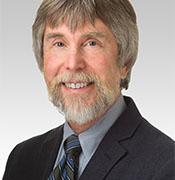How Would a Northwestern Professor Manage His Own Liver Cancer?

Curious Dr. George
Cancer Commons Editor in Chief George Lundberg, MD, is the face and curator of this invitation-only column

Al B. Benson III, MD Professor, Medicine, Hematology Oncology Division; Feinberg School of Medicine
When facing a frightening new cancer diagnosis, some people ask their doctors, “What would you do if you were me?” Here, our Curious Dr. George asks liver cancer expert Al B. Benson III, MD, FACP, FACCC, FASCO, how he would handle his own hypothetical case of liver cancer. Dr. Benson is Professor of Medicine and Associate Director for Cooperative Groups at the Robert H. Lurie Comprehensive Cancer Center of Northwestern University.
Curious Dr. George: Please consider this hypothetical scenario: As a busy academic oncology practitioner, you know that you contracted hepatitis C many years ago and developed chronic active hepatitis leading to fibrosis before you received sufficient Solvadi to eradicate the virus. The fibrosis led to early cirrhosis, which is now being mo
nitored by your physician. You have experienced recent weight loss and some right upper abdominal pain. Abdominal ultrasound has shown many liver nodules thought to be reactive proliferation. But your most recent serum alpha fetoprotein (AFP) has elevated to 375 ng/ml, raising the suspicion that you may now have hepatocellular carcinoma (HCC), perhaps multifocal. How would you proceed?
Al B. Benson, MD, FACP, FACCC, FASCO: I would certainly be concerned about now having a diagnosis of HCC with the known risk of having had hepatitis C, evidence of cirrhosis, and development of some symptoms. Having said that, I would recognize that the current AFP result is a bit controversial since acute inflammation and liver cell regeneration can cause an increase in AFP. It would appear that the abdominal ultrasound suggests reactive proliferation without definite evidence of HCC. Since I would be worried that the standard screening with AFP and ultrasound in my case may not have definitely ruled out HCC, I would favor proceeding with additional imaging, such as multiphasic CT scans. Once I had a contrast-enhanced abdominal CT scan I would then request review by a multidisciplinary team. If the team—particularly from the viewpoint of radiology, interventional radiology, and hepatology—agree that the lesions do not fit the criteria for HCC and are confident a biopsy would not be indicated, I would continue monitoring with very close follow-up. It would be important to make sure my liver function tests (LFTs) were not changing in terms of my cirrhosis, and there would need to be discussion as to the etiology of my symptoms.
Let us assume, however, that my CT scan fits imaging criteria for HCC. Of note. if imaging criteria are met, a biopsy would not be necessary for diagnosis, although I might still consider a biopsy—particularly for analysis by next-generation sequencing (NGS)—for the chance that there might be a molecular profile which could inform a therapeutic choice or participation in a clinical trial. If imaging was inconclusive, I would favor a biopsy to confirm the diagnosis.
Prior to a biopsy, I would want review by a transplant team as part of a multidisciplinary discussion to determine if I was a potential resection or transplant candidate, which for HCC would be my preferred treatment choice if I met the criteria for either resection or transplantation. If it was clear that resection or transplantation was not feasible, and there was no evidence of metastatic disease on CT imaging—including chest, abdomen and pelvis—then I would review with interventional radiology about the possibility of liver-directed therapy, such as Y90 radioembolization, including the possibility of participating in an available liver-directed therapy clinical trial.
Systemic therapy would be the choice if liver-directed therapy was not an option. A number of biologically driven therapies have been developed, including immunotherapy, expanding choices for individuals, with additional regimens in development in clinical trials. In my case, I would undergo an esophagogastroduodenoscopy (EGD) to evaluate presence/stability of varices, and if there is no contraindication, consider therapy with atezolizumab plus bevacizumab, with tremelimumab plus durvalumab as an alternative choice. If symptom control became an increasing issue, I would seek advice from the palliative care team.
To help friends and family better understand the management of hepatocellular cancer, I would refer them to the National Comprehensive Cancer Network (NCCN) guidelines for patients.
Dr. Benson can be reached at albenson@nm.org.


